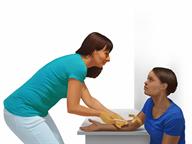When Your Baby Is Born Without Parts of the Brain, Skull, or Scalp (Anencephaly): What to Know
Anencephaly is a very serious birth defect in which a baby is born without parts of the brain, skull, and scalp. Anencephaly occurs when a tube that will become the spinal cord and brain, called the neural tube, fails to close at the top as it should during the baby's development in the womb. This is known as a neural tube defect (NTD). A developing baby's neural tube normally closes 3–4 weeks into the pregnancy, before most women know they are pregnant. Most babies born with this condition are stillborn or die shortly after birth.
What are the causes?
The cause of this condition is usually not known. It may be caused by:- Problems with genes or chromosomes.
- Exposure to a toxin.
What increases the risk?
The following factors may make it more likely that your baby will develop this condition:- You lack folic acid in your diet.
- You have a family history of having a baby with anencephaly or any other NTD.
- You have diabetes before becoming pregnant (pregestational diabetes).
- You are obese.
What are the signs or symptoms?
The main symptom of this condition is that a baby is born without a part of the brain or skull. Most babies with this condition are missing a part of the brain that controls thinking and coordination.
How is this diagnosed?
 This condition is usually diagnosed during pregnancy, often during the first trimester. A diagnosis may be made by:
This condition is usually diagnosed during pregnancy, often during the first trimester. A diagnosis may be made by:- Ultrasound.
- Blood tests.
Sometimes anencephaly is not diagnosed during pregnancy. In that case, a health care provider will see the condition as soon as the baby is born.
How is this treated?
There is no cure or treatment for this disorder.- Talk to your health care provider about your options during pregnancy and after birth.
- After your baby is born, treatment will focus on making your baby as comfortable as possible.
Follow these instructions at home:
-
Keep all of your scheduled prenatal visits.
-
Consider seeking emotional support. This could include support from your spiritual leader, friends, family, a professional counselor, or a support group.
-
Take over-the-counter and prescription medicines only as told by your health care provider.
-
Do not drink alcohol. There is no safe level of alcohol consumption during pregnancy.
-
Do not use any drugs.
-
Let your health care provider know if you have had a pregnancy that was affected by an NTD.
Where to find more information
-
Centers for Disease Control and Prevention: www.cdc.gov
Contact a health care provider if:
-
You have dizziness.
-
You have mild pelvic cramps, pelvic pressure, or nagging pain in the abdominal area.
Get help right away if:
-
You have a fever.
-
You have spotting or bleeding from your vagina.
-
You are leaking fluid from your vagina.
-
You have severe abdominal cramping or pain.
Summary
-
Anencephaly is a serious birth defect in which a baby is born without parts of the brain, scalp, and skull. Most babies born with anencephaly are stillborn or die shortly after birth.
-
There is no cure or treatment for this disorder. Talk with your health care provider about your options during pregnancy and after birth.
-
Consider seeking emotional support. This could include support from your spiritual leader, friends, family, a professional counselor, or a support group.
This information is not intended to replace advice given to you by your health care provider. Make sure you discuss any questions you have with your health care provider.

